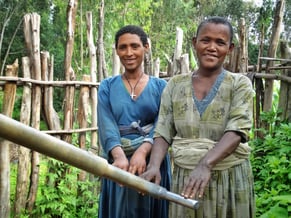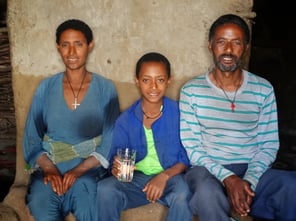 |
| Alemnesh (L) and Yeshiwas enjoy time they have at the well site |
“Praise God, for now I have time for myself. Fetching water is no more a burden, rather, a time break I get from the house chores and have a little chat with my neighborhood friends. We rest for a while, talk experiences, laugh and share ideas. A walk for clean water has transformed my life,” says Alemnesh.
Alemnesh Fente, 30, lives in the rural village of the Yilmana Densa district where World Vision has an area program office. Before World Vision arrived, there was a big need for water in this vulnerable community.
Everyone in the village faced challenges fetching drinking water from the nearby river. “We faced the worst challenge during the rainy season, where everyone had the fear of being taken by the river because it gets full and the river becomes aggressive,” says Alemnesh. “During the dry season the challenge continues as we have to get out of our houses as early as 2am in order to get to the front line of queue, as the water volume starts to decrease once the sun comes out. People lose their patience waiting for long lines to collect that dirty water and at some point, begin arguing with one another. Back then, we had to pass though life’s hardship in order to survive,” she says.
Alemnesh reflects on the difference today, “As I walk to the new shallow well constructed by World Vision, each day I pass by that river. And I remember the time that passed, when me and my friends struggled. All we thought and talked about was getting our part of that dirty water. Now we live in a new era. Time changed, and we get to experience clean water. I simply walk out of my house and carry back my full jerry-can of clean water.”
 |
| Alemnesh with one of her children and husband, enjoy clean water |
Yeshiwas, Alemnesh’s neighbor and close friend says, “I long for the time we meet with excitement. I enjoy the moments we steal getting out of our homes to stay away from the routine task we have. I raise my voice to call Alemnesh and let her know it’s time for water. She comes out of her house and we go to the water well and come back together. It’s a blessed time that has come to us!” she concludes.
“Being a wife and mother of four children, I felt burdened and expected assistance from my husband and kids too,” said Alemnesh. “Since I no longer need that, I let my husband focus on his farming, and for my kids, I only want them to concentrate on their education, which I’m witnessing a lot of change in their performance,” she says.
Alemnesh continues, “The afternoon shift of fetching water is my favorite. I get to finish all my house chores in time and get to spend a while chatting with the other women coming to fetch water. I get the chance to talk about our social life, our children and marriage. I feel refreshed and get back home for the rest of the assignments that waits me at home.”







